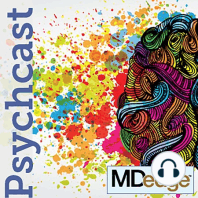23 min listen
The role of inflammation in mental illness with Dr. Roger McIntyre
FromPsychcast
ratings:
Length:
32 minutes
Released:
Aug 28, 2019
Format:
Podcast episode
Description
Show Notes Roger McIntyre, MD, joins Lorenzo Norris, MD, host of the MDedge Psychcast and editor in chief of MDedge Psychiatry, to talk about obesity, inflammation, and treatment implications for mental health conditions. They spoke at the Focus on Neuropsychiatry 2019 meeting, sponsored by Current Psychiatry and Global Academy for Medical Education. Dr. McIntyre is a professor of psychiatry and pharmacology at the University of Toronto, and head of the mood disorders psychopharmacology unit at the University Health Network, also in Toronto. For a complete video of this interview, please visit the vodcast. Don’t miss the “Dr. RK” segment by Renee Kohanski, MD, who discusses how to think through whether sharing personal information with patients helps move their therapy forward. Dr. Kohanski, a member of the MDedge Psychiatry Editorial Advisory Board, is a psychiatrist in private practice in Mystic, Conn. Show notes by Jacqueline Posada, MD, consultation-liaison psychiatry fellow with the Inova Fairfax Hospital/George Washington University program in Falls Church, Va. Reconceptualizing mental illness by looking at inflammation Mental illness should be viewed as a disease involving many organs – including the brain – and psychiatry should expand its understanding of the etiology of mental illness. Increasingly, research suggests that a subgroup of people with mental disorders, including those with a variety of diagnoses, have symptoms related to alterations in their immune system and inflammation. Inflammation plays a role in disparate psychiatric diagnoses, including childhood disorders such as obsessive-compulsive disorder, ADHD, and autism, and adult disorders such as schizophrenia, depression, and Alzheimer’s disease. Currently, psychiatry uses the monoamine paradigm to explain psychiatric diagnosis, and most medications were developed using that paradigm. A subgroup of people is not sufficiently helped by current medications, so looking at inflammation as a driver of mental illness provides another biological avenue to pursue drug development. Role of obesity and chronic health conditions in worsening inflammation Obesity, particularly abdominal obesity, is overrepresented in people with mental illness and is not fully explained by either social determinants of health or medication side effects. Obesity and mental illness have a bidirectional relationship; each affects the body as multiorgan system diseases. Mental illness can be conceptualized as a kind of “metastasis to the brain.” Adipose tissue releases a surfeit of neurochemicals hazardous to brain function and that disrupt neurocircuitry. For example, compared with an individual with major depressive disorder (MDD) only, an individual with MDD and obesity is more likely to have symptoms driven by inflammation, such as anhedonia, cognitive impairment, limited motivation, and a dysregulated reward system. Obesity should also be a target symptom worthy of a focused treatment plan. Heart disease is the leading cause of death in schizophrenia, and coronary artery disease is an inflammatory illness. Research is identifying connections between psychiatric illness such as schizophrenia and potentially inflammatory driven symptoms, often called “sickness behaviors,” such as low motivation, anhedonia, and cognitive impairment. Clinical implications of obesity and inflammation Alterations in inflammation and metabolism are not just a consequence of obesity. For example, patients will bipolar disorder who report sexual or physical trauma are more likely to be in a proinflammatory neurochemical state and benefit from anti-inflammatory interventions. Are patients with early trauma who do not respond fully to “traditional” monoamine medications part of the subpopulation who respond to anti-inflammatory interventions because trauma is driving inflammation? The genetics of mental illness already are complicated and will be influenced by the environment and a “proinflammat
Released:
Aug 28, 2019
Format:
Podcast episode
Titles in the series (100)
Joseph Pierre: Dual Diagnoses part I: How do you treat patients with dual diagnoses. by Psychcast
